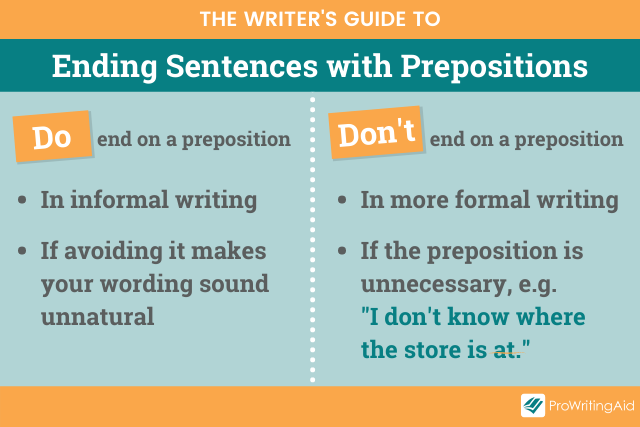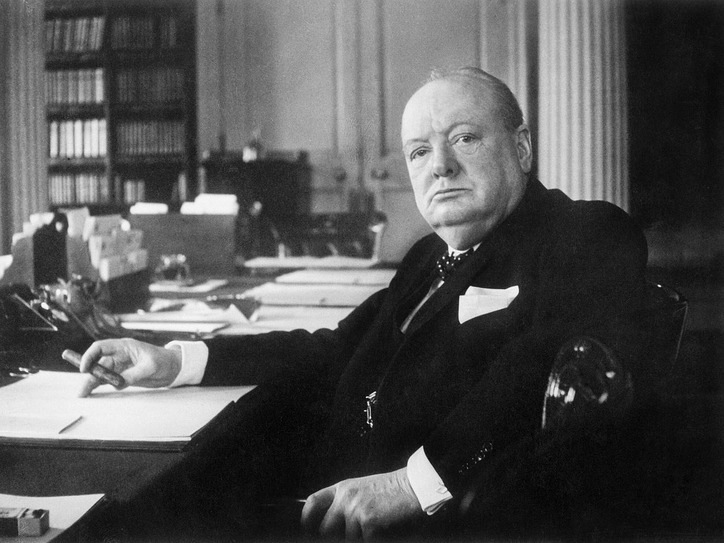Well, the point is that it is correct (in some cases) to end a sentence with a preposition. (grammatically correct, but unnatural) that said, it is sometimes more elegant to move a preposition to an earlier spot in a sentence, especially in very serious and.


However, keep in mind that while ending a sentence with a preposition may be grammatically correct, it can be unnatural.



Is ending a sentence with a preposition grammatically correct. But, you can't always end sentences with prepositions. Ending a sentence with a preposition such as with, of, and to, is permissible in the english language. Yes, you can end a sentence with a preposition in english.
However, both sentences are grammatically correct in common day english, yet each are just a different style. Trying to avoid this can often result. It's fine to end sentences with prepositions.
In our example, the preposition is the word “in.” so we now know that the prepositional phrase starts at the word “in.” find the noun or pronoun that ends the prepositional phrase. Just be aware that some people might judge your writing as incorrect if you use prepositions at. Can you start a sentence with a preposition?
Yes, you can end a sentence with a preposition. As i said last week, i recommend that when you could leave off the preposition and it wouldn't change the meaning, it’s best to leave it off. In fact, in some situations, you have to end a sentence with a preposition because there is no other choice.
Starting a sentence with an introductory phrase that begins with a preposition and ending a sentence with a stranded preposition can be grammatically correct. Ending a sentence with a preposition. If you’ve ever heard that you can’t end a sentence with a preposition, you’re not alone.
The hebrews were a group of jewish tribes; Many native english speakers are taught that they should not end sentences with prepositions.this is a matter of style rather than grammar. Similarly, it is asked, is it grammatically correct to end a sentence with a preposition?
Improve grammar, word choice, and sentence structure in your writing. Simply reorganizing the structure of the sentence and placing the preposition towards the end can make it flow more naturally. However, while it’s still frowned upon by traditional readers, it’s not technically an error.
It’s not true and it never was true. The rule of not doing so is an import from latin grammar, and never fits with english grammar rules. Ending a sentence with a preposition has long been considered grammatically incorrect.
People do use unnecessary prepositions at the end of sentences when they talk, as in the question “where are you at?” that we talked about last week. Ending a sentence with a preposition. There are many rules to consider while revising your text for proper sentence structure.
But if you’re writing a research paper or submitting a business proposal and you want to sound very formal, avoid ending sentences with prepositions. It is perfectly acceptable to end a sentence with a preposition. It is fine to end a sentence with a preposition;
You should never use a preposition to end a sentence with. Let’s discuss the main of them. Our language is supposed to evolve with how we speak, so if something becomes common usage (like ending sentences with prepositions), eventually, the grammarians will accept it.
It is acceptable to end a sentence with a preposition. There are theories that the false rule originates with the early usage guides of joshua poole and john dryden, who were trying to align the. However, lots of people still consider it an error.
If you have to convolute your sentence to avoid the preposition, leave it as is. It would be grammatically correct to say: The sentence is grammatically incorrect in a different way.
The sentence must contain a subject and a verb, otherwise, it will be considered a sentence fragment, not a complete sentence. Use of the sentence “what was that for?” is perfectly acceptable in speech and in writing. And in many cases, so is ending a sentence with a preposition.
Furthermore, a jew is a person, not a tribe or nation. It’s not an error to end a sentence with a preposition, but it is a little less formal. Prepositions in sentences the best way to start a sentence with a preposition is in an introductory phrase.
Other cases where using a preposition at the end of. No, it is not correct to end a sentence with a preposition, though there are verbal phrases which are informal and idiomatic that will pass muster: Indeed, doing so is both grammatical and idiomatic.
Therefore, to ensure you don't annoy those readers, you should consider avoiding a preposition at the end of your sentence. Improve grammar, word choice, and sentence structure in your writing. 5 rules for building a grammatically correct sentence.
Note that in formal communication (such as a job application or a statement of purpose), people often rewrite sentences to avoid such usage. Prepositions, ending a sentence with. They satisfied at least one definition of a nation.
Despite the fact that ending a sentence with a preposition is grammatically correct in english, the myth that it is wrong is still very prevalent among native speakers and learners alike. “the kids’ rooms needed to be cleaned up,” “the paper was already written on,” or “the situation was really messed up.”. Ending a sentence with a preposition is perfectly fine.
Jewish is an adjective, not a noun. The old claim that it’s wrong to end a sentence with a preposition has been utterly debunked. In emails, text messages, and notes to friends, it’s perfectly fine.















0 komentar:
Posting Komentar